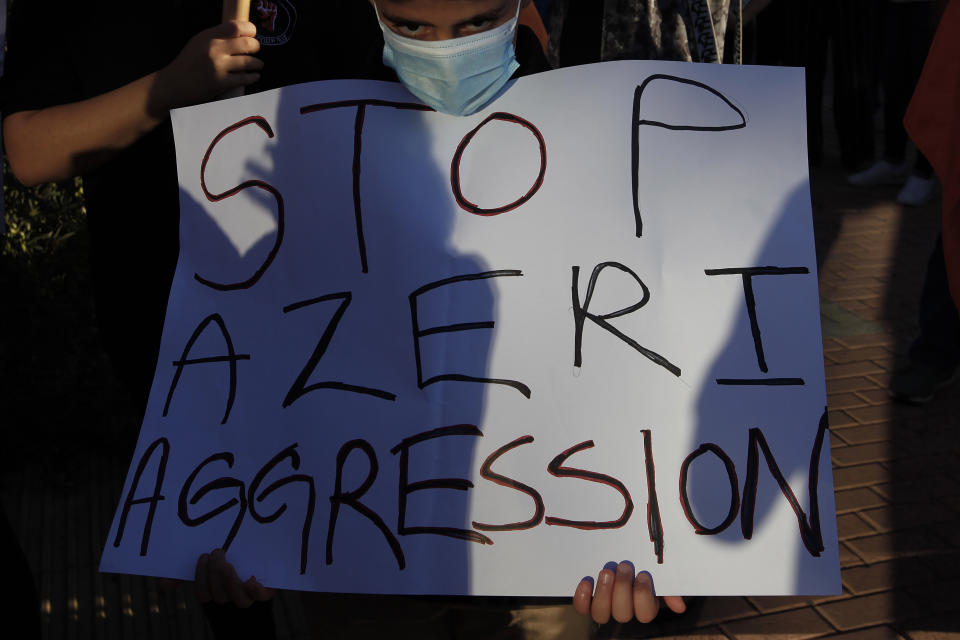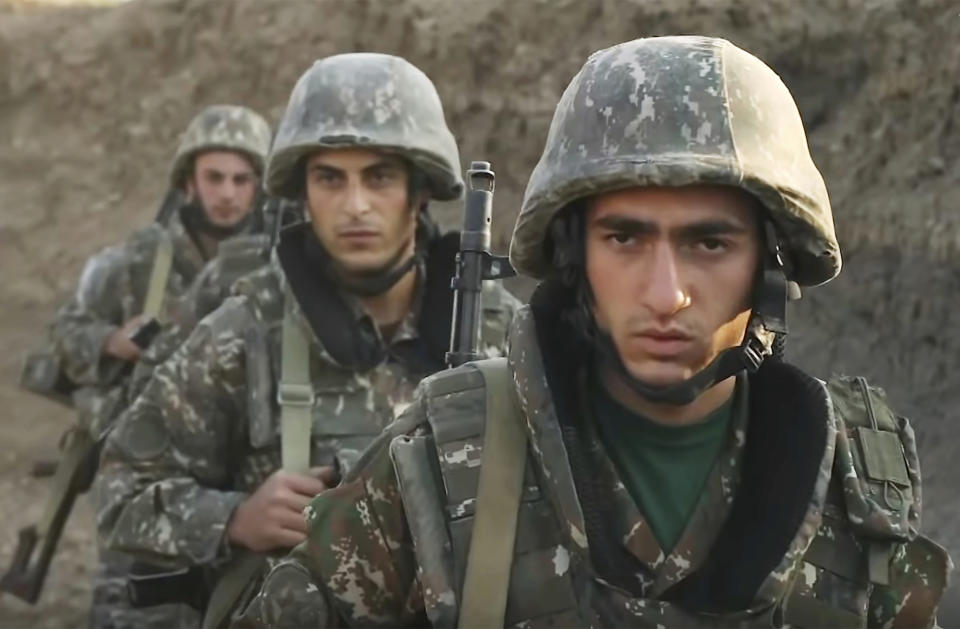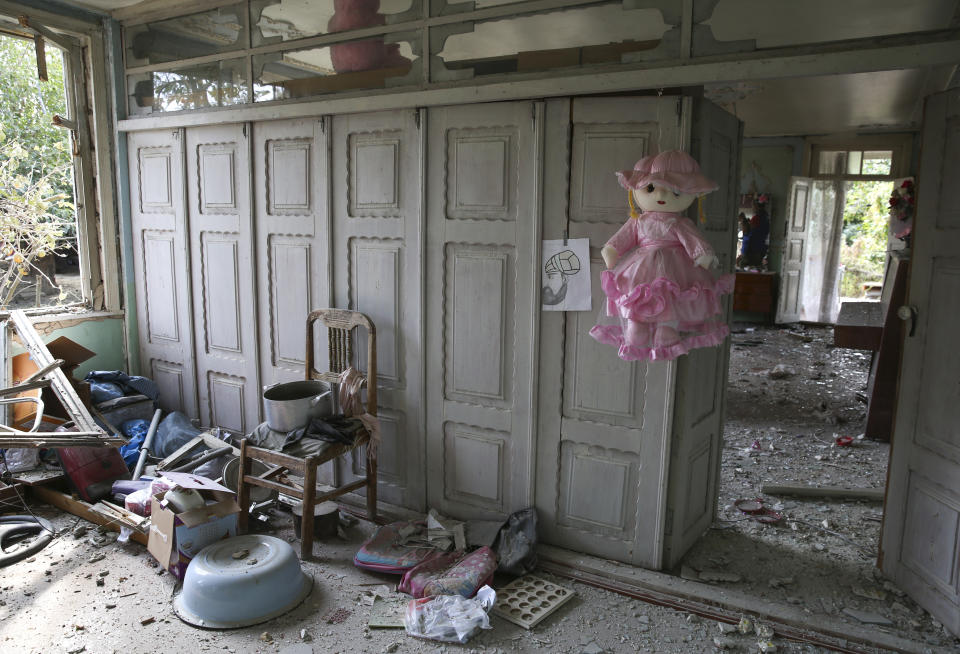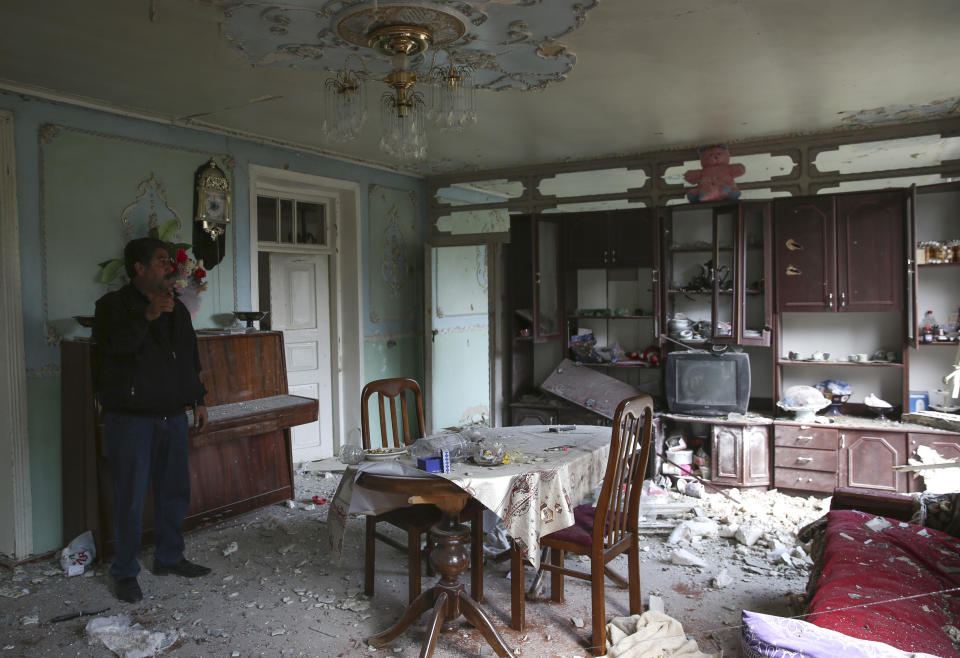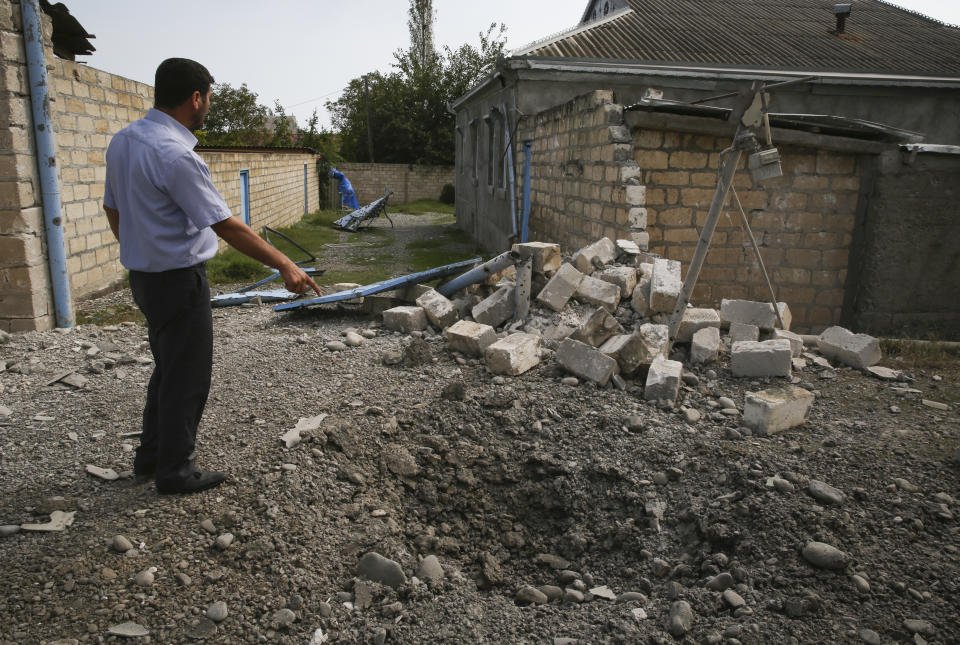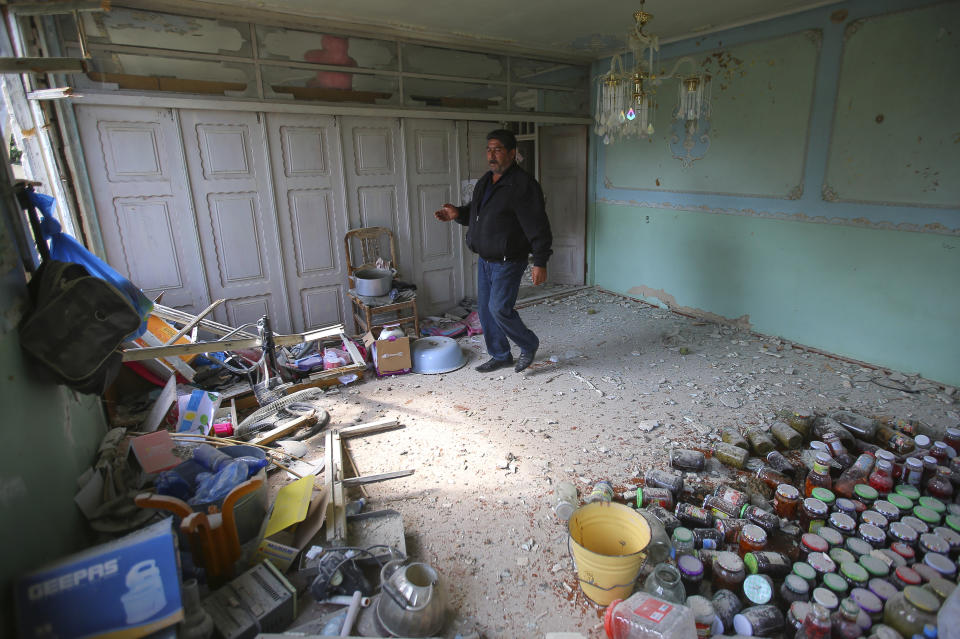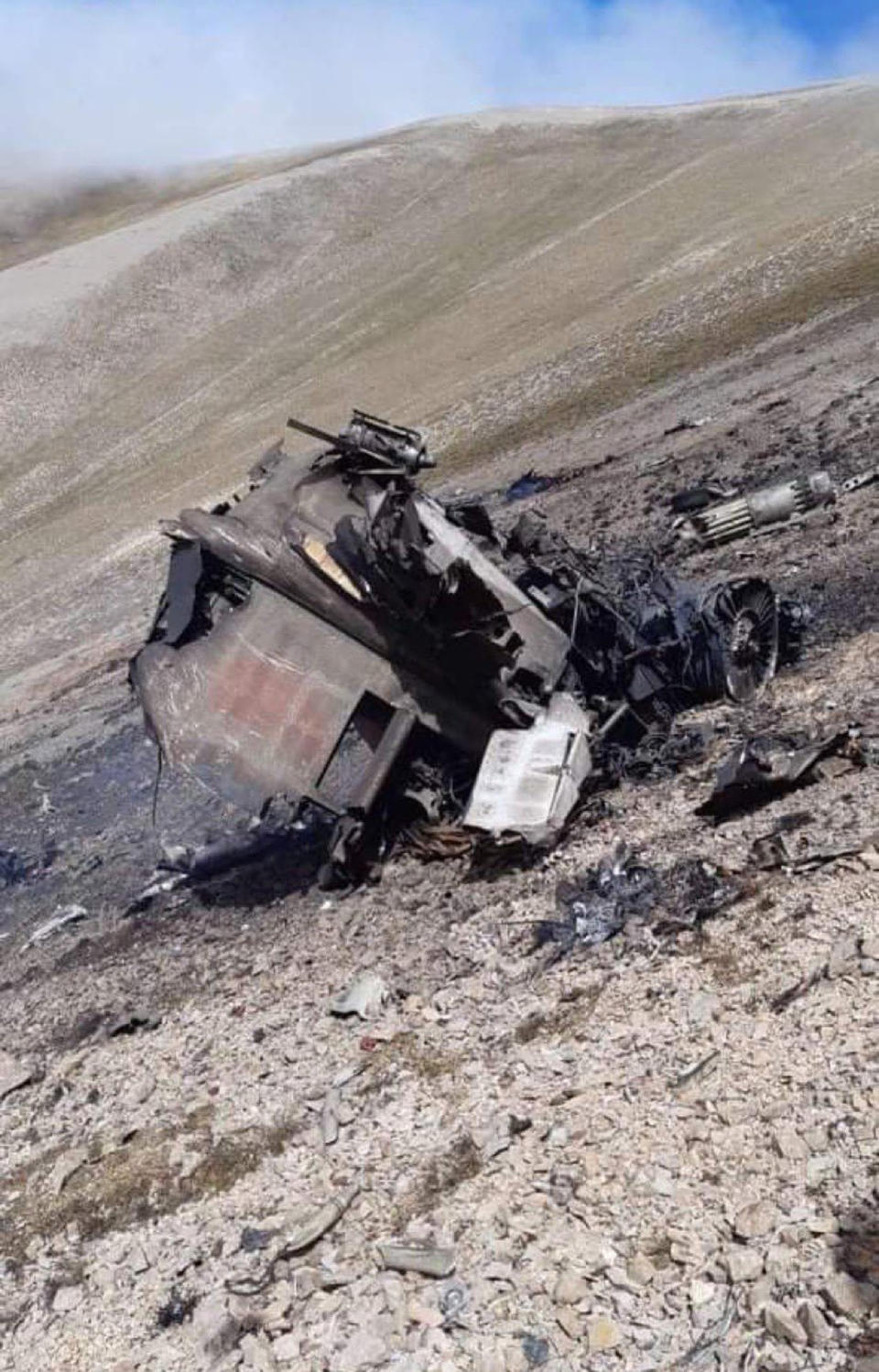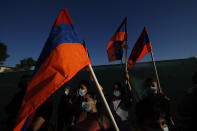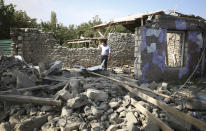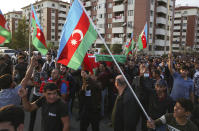Azerbaijan, Armenia no closer to ending clashes after 4 days
YEREVAN, Armenia (AP) — Heavy fighting between Armenian and Azerbaijani forces over the separatist region of Nagorno-Karabakh continued for a fourth straight day on Wednesday, with statements from both sides indicating that the flare-up of a decades-old conflict that has killed dozens of people since Sunday was no closer to an end.
The president of Azerbaijan said Armenia's withdrawal from Nagorno-Karabakh was the sole condition to end fighting over the separatist territory. Armenian officials alleged Turkey's involvement in the renewed conflict and said its neighbor's actions “hinder the efforts of the international community to cease the hostilities.”
Meeting with wounded servicemen, Azerbaijani President Ilkham Aliyev said Armenia must “unconditionally, completely and immediately leave” Nagorno-Karabakh, which lies within Azerbaijan and has been under the control of ethnic Armenian forces backed by the Armenian government since 1994.
“If Armenia’s government fulfills it, the fighting will stop, blood will not be shed, there will be peace,” Aliyev was quoted by the Russian state Tass news agency as saying.
The scenario laid out by the Azerbaijani leader is at odds with Armenia’s views on ending the crisis. Aliyev's statement came a day after Armenian Prime Minister Nikol Pashinyan said that Azerbaijan's “aggression towards Nagorno-Karabakh and Armenia” needed to end before any compromise could be reached.
On Wednesday, Pashinyan said that Armenia may recognize Nagorno-Karabakh as independent, a move that could further interfere with a potential settlement of the dispute.
Armenia and Azerbaijan have been locked for decades in a conflict over Nagorno-Karabakh, where a separatist war was fought in the late 1980s until three years after the breakup of the Soviet Union. The region in the Caucasus Mountains of about 4,400 square kilometers (1,700 square miles), roughly the size of the U.S. state of Delaware, is 50 kilometers (30 miles) from the Armenian border.
Soldiers backed by Armenia occupy the region as well as some Azerbaijani territory outside of it.
The latest fighting in Nagorno-Karabakh has since killed at least 84 servicemen on the separatist region's side, as well as several civilians. Azerbaijani officials didn't provide details on its military casualties but said 14 civilians have been killed and 46 wounded on its side.
On Wednesday, the fighting continued despite repeated calls for a cease-fire from around the globe. Both sides blamed each other for attacks, and Armenia claimed that Turkish drones and fighter jets were being used in the region. Turkey and Azerbaijan denied it.
The conflict escalated on Tuesday, with Armenia claiming that a Turkish F-16 fighter jet shot down an SU-25 from its air force in Armenian airspace, killing the pilot.
Turkey, which has been vocal about siding with Azerbaijan in the dispute, denied those claims, and so did Azerbaijan.
Hikmet Hajiyev, an aide to Azerbaijani President Ilkham Aliyev, told reporters via teleconference on Wednesday that the incident involved two Armenian SU-25 planes that reportedly crashed into a mountain, rather than an F-16 downing a SU-25.
Armenia on Wednesday continued to allege Turkey's involvement in the conflict, saying that Turkish drones and F-16 fighter jets were being deployed in Nagorno-Karabakh.
Armenia’s Foreign Ministry demanded “immediate withdrawal of the Turkish armed forces, including the air force, from the conflict zone” in a statement.
“The provocative actions of the Turkish armed forces seriously undermine the regional security and hinder the efforts of the international community to cease the hostilities,” the statement read.
Turkey’s Defense Ministry denied claims that Turkey’s planes and drones were deployed to help Azerbaijan, dismissing them as propaganda by Armenia. The ministry said Armenia sought to increase international support “by creating the perception” that it was fighting Turkey.
However, Turkish Foreign Minister Mevlut Cavusoglu said that “If Azerbaijan makes a request, we would do the necessary.”
Earlier this week, Armenian officials also claimed that Turkey sent fighters from Syria to Azerbaijan. Turkish officials dismissed the accusation. However, the Britain-based Syrian Observatory for Human Rights, an opposition war monitor, said Wednesday that so far some 850 Syrian fighters have arrived in Azerbaijan and hundreds more were expected to arrive there in the coming days.
Meanwhile, European officials are seeking to bring the opposing sides to the negotiating table.
French President Emmanuel Macron, speaking on Wednesday at a news conference in Riga, Latvia, called for talks between France, Russia and the United States — the three countries co-chair the Minsk group, set up in 1992 by the Organization for Security and Cooperation in Europe to resolve the conflict — to mediate.
“I will speak to President (Vladimir) Putin tonight and, I think, President (Donald) Trump tomorrow to discuss and propose an exit strategy” for the crisis, Marcon said.
The French president also condemned recent comments from Turkey as “reckless and dangerous" and said he was "extremely preoccupied by the belligerent messages from Turkey in the past hours.”
Greek Foreign Minister Nikos Dendias has called for an emergency meeting of the OSCE that would include Azerbaijan and Armenia to try and achieve a swift end to hostilities over Nagorno-Karabakh and a resumption of negotiations.
“The escalation of tension in Nagorno-Karabakh has a serious impact on regional stability,” Dendias said, adding that he is in contact with his counterpart from Armenia and is planning a visit to Yerevan soon. Dendias also called on regional rival Turkey to end actions that would further escalate the conflict.
___
Daria Litvinova in Moscow, Suzan Fraser in Ankara, Turkey, Sylvie Corbet in Paris and Bassem Mroue in Beirut contributed to this report.

 money
money 